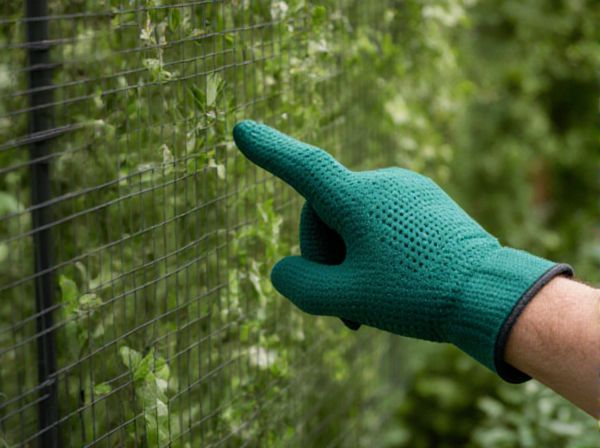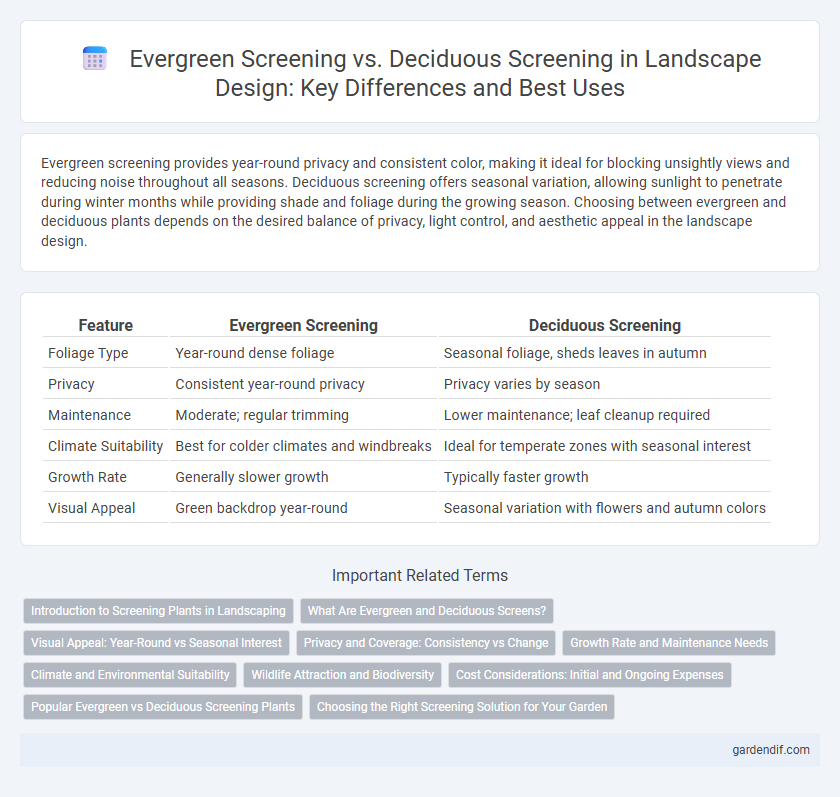
evergreen screening vs deciduous screening Illustration
Evergreen screening provides year-round privacy and consistent color, making it ideal for blocking unsightly views and reducing noise throughout all seasons. Deciduous screening offers seasonal variation, allowing sunlight to penetrate during winter months while providing shade and foliage during the growing season. Choosing between evergreen and deciduous plants depends on the desired balance of privacy, light control, and aesthetic appeal in the landscape design.
Table of Comparison
| Feature | Evergreen Screening | Deciduous Screening |
|---|---|---|
| Foliage Type | Year-round dense foliage | Seasonal foliage, sheds leaves in autumn |
| Privacy | Consistent year-round privacy | Privacy varies by season |
| Maintenance | Moderate; regular trimming | Lower maintenance; leaf cleanup required |
| Climate Suitability | Best for colder climates and windbreaks | Ideal for temperate zones with seasonal interest |
| Growth Rate | Generally slower growth | Typically faster growth |
| Visual Appeal | Green backdrop year-round | Seasonal variation with flowers and autumn colors |
Introduction to Screening Plants in Landscaping
Evergreen screening plants provide year-round privacy and aesthetic appeal with dense foliage that remains vibrant through all seasons. Deciduous screening plants offer seasonal interest with changing colors and allow sunlight penetration during winter months when leaves fall. Choosing between evergreen and deciduous screening depends on climate, desired privacy level, and landscape design goals.
What Are Evergreen and Deciduous Screens?
Evergreen screens consist of plants that retain their foliage year-round, providing consistent privacy and wind protection in landscapes. Deciduous screens are made up of trees or shrubs that shed their leaves seasonally, allowing for increased sunlight in winter while offering shade and screening in summer. Both types serve functional and aesthetic purposes, with evergreens offering permanent coverage and deciduous plants contributing seasonal variation.
Visual Appeal: Year-Round vs Seasonal Interest
Evergreen screening provides consistent visual appeal year-round with dense foliage that maintains privacy and color through all seasons. Deciduous screening offers seasonal interest by showcasing vibrant leaf color changes in fall and allowing more light during winter when leaves drop. Combining both types enhances landscape aesthetics by balancing continuous greenery with dynamic seasonal transformation.
Privacy and Coverage: Consistency vs Change
Evergreen screening provides consistent privacy and year-round coverage, ensuring dense foliage blocks views throughout all seasons. Deciduous screening offers seasonal variation, with privacy benefits peaking in spring and summer but less coverage during winter months. Selecting between the two depends on whether steady privacy or dynamic seasonal aesthetics is the priority.
Growth Rate and Maintenance Needs
Evergreen screening plants typically have a moderate to fast growth rate, providing year-round privacy and requiring regular pruning to maintain shape and health. Deciduous screening plants often grow faster but lose their leaves seasonally, demanding seasonal cleanup and occasionally more intensive maintenance in spring and fall. Both options require tailored care, but evergreen screens generally need consistent trimming, while deciduous screens benefit from seasonal pruning and leaf management.
Climate and Environmental Suitability
Evergreen screening plants provide year-round privacy and are ideal for colder climates where retaining foliage during winter helps reduce wind chill and conserve soil moisture. Deciduous screening is better suited for regions with distinct seasonal changes, as it allows sunlight penetration in winter to warm buildings while providing shade in summer, enhancing energy efficiency. Selecting species adapted to local climate conditions ensures optimal growth, environmental benefits, and sustainable landscape screening.
Wildlife Attraction and Biodiversity
Evergreen screening provides year-round shelter and food sources, supporting consistent wildlife attraction and promoting stable biodiversity in landscapes. Deciduous screening offers seasonal habitat variety, benefiting species that rely on changing foliage and allowing diverse flora and fauna cycles. Combining both types enhances ecosystem complexity and supports a wider range of wildlife throughout the year.
Cost Considerations: Initial and Ongoing Expenses
Evergreen screening typically involves higher initial costs due to mature plant material and slower growth rates, but offers year-round privacy and lower maintenance expenses. Deciduous screening often has lower upfront prices and faster growth, yet requires seasonal cleanup and pruning, increasing long-term maintenance costs. Evaluating both the installation fees and recurring care expenses is crucial for cost-effective landscape planning.
Popular Evergreen vs Deciduous Screening Plants
Popular evergreen screening plants such as Leyland Cypress, Thuja Green Giant, and Eastern Red Cedar provide year-round privacy and maintain dense foliage throughout all seasons. In contrast, deciduous screening plants like Viburnum, Hornbeam, and Crabapple offer seasonal interest with vibrant spring blooms and autumn foliage while shedding leaves in winter. Choosing between evergreen and deciduous screening depends on the desired balance of perennial coverage versus seasonal color and texture in landscape design.
Choosing the Right Screening Solution for Your Garden
Evergreen screening provides year-round privacy and wind protection, making it ideal for gardens that require consistent coverage and low maintenance. Deciduous screening offers seasonal interest with changing foliage colors and increased light penetration in winter, suitable for gardens seeking dynamic aesthetic appeal. Selecting the right screening solution depends on climate, desired privacy level, and whether permanent coverage or seasonal variation best complements your garden design.
evergreen screening vs deciduous screening Infographic

 gardendif.com
gardendif.com